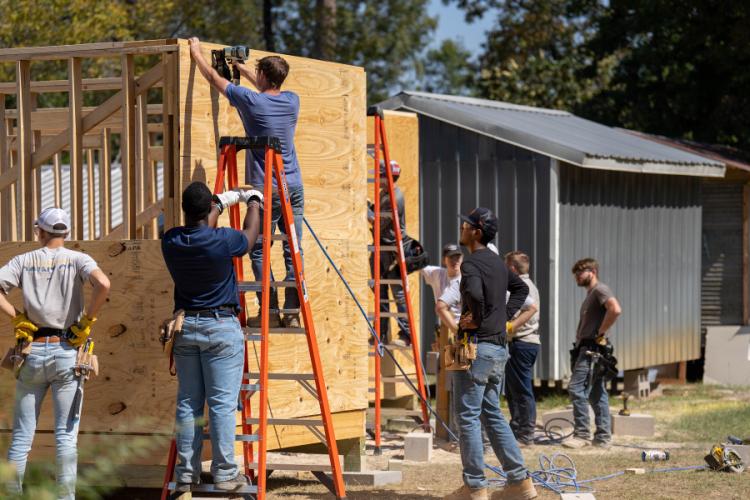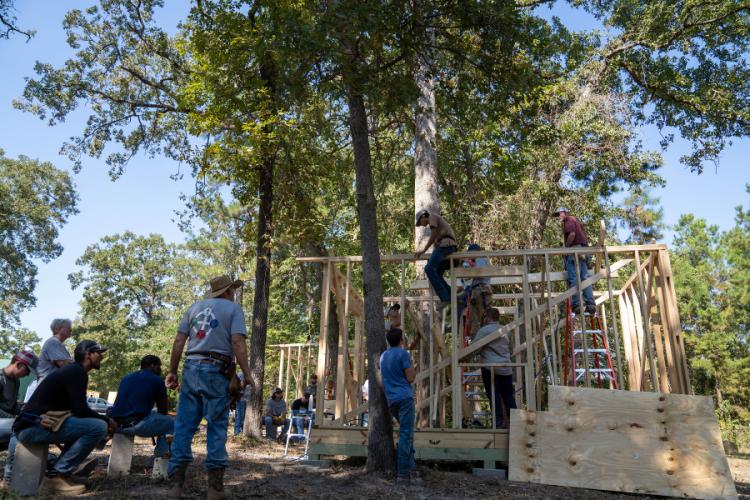NACOGDOCHES, Texas — On a sunny day this fall, Cullum Brownlee removed his baseball cap, wiped the sweat from his brow and took a swig of cold water. Out on a busy construction site just east of Nacogdoches, he and other Stephen F. Austin State University students were building four tiny homes at Village Nac, a faith-based community for residents with chronic mental health and homelessness issues.
Earning three hours of credit and hands-on experience through the fall-only “Building Construction Systems” course and its associated lab, Brownlee is doing his part to make sure sturdy houses get built for those in need. A construction management major in the James I. Perkins College of Education’s School of Human Sciences, he and other students are engaging in every step of the homebuilding process — from the foundation and framing to the electrical system and roof.
“This is the best class I’ve taken at SFA,” Brownlee said, speaking over the chug of an air compressor, the whir of a saw and the punch of a nail gun. “We’re learning how to frame and build stud walls and do insulation. All sorts of things go into building a house, and we’re doing them all for the residents here. You also have that little bonus of feeling good about doing good on top of what you’re learning.”
Working in teams of four, the 16 students enrolled in the course are building 120-square-foot homes, each with a porch and a kitchenette. At around $16,000 apiece, and with no running water, the “sleeping pods” are humble but effective.
During the next spring semester, SFA interior design students will finish the homes with paint and furnishings. While they will not earn spring semester course credit, they will fulfill the mandatory six hours of community service needed to obtain the bachelor’s degree in interior design.
The project, funded by a $115,000 grant from SFA’s Center for Applied Research and Rural Innovation, is the first of its kind in the education college. But it’s not expected to be the last.
Sally Ann Swearingen, SFA associate professor of interior design and construction management, applied for a second CARRI grant with the intention of continuing the tiny home project next year, and perhaps not just at Village Nac but at other regional locations. Moreover, Swearingen said she wants to establish a construction management course with a focus on commercial building, giving students yet another opportunity to gain on-the-job experience while contributing to the greater community.
“Service learning should be an important part of any type of academia,” Swearingen said. “We’ve always made sure students know they should give back by using their talents. You can show slides all day long, but until you actually, physically do something, you never know if it’s done right or not. You can’t replicate this in the classroom.”
The building blocks are certainly in place for the School of Human Sciences to establish a long-term on-site construction program. Students would provide the labor, and with current CARRI grant funding, Swearingen has already purchased some equipment, including two trailers with cabinetry and shelving and a hulking Ford Super Duty F-350 pickup.
The construction management degree program — a partnership between SFA’s Perkins College of Education, Rusche College of Business, Arthur Temple College of Forestry and Agriculture, and College of Sciences and Mathematics — was established in 2019 and now has 84 enrolled students.
Accepting its first residents in 2020, Village Nac has grown steadily over the last two years. Thanks to SFA students and hundreds of community volunteers, the first neighborhood is almost finished and the second is now under construction. The goal is to build out the 21-acre site to seven total neighborhoods with each housing 20 people.
Laura Culpepper, who cofounded Village Nac with Constance Engelking, said the construction management project came at the right time and will affect the village in a meaningful way.
“We needed tiny homes, and SFA needed a place to build them,” Culpepper said. “The four new homes being built represent more than a great class project. From our perspective, these homes will be a huge contribution to our mission of providing a sense of community to those who need it most. We are so grateful for this beautiful partnership and for the investment these hardworking students are making in the lives of others.”
To learn more about SFA’s construction management program, visit sfasu.edu/hms. Information on Village Nac can be found at thevillagenac.com.
 Axe ’Em, Jacks!
Axe ’Em, Jacks!

